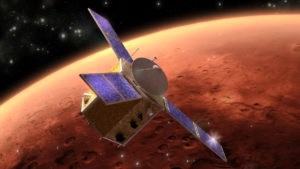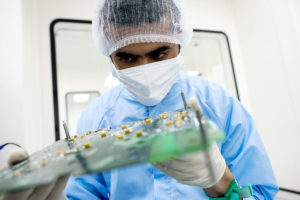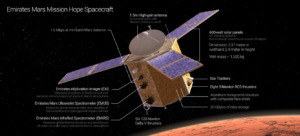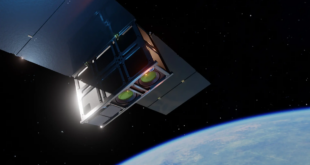
The UAE’s mission to Mars and its proposed Martian colony to be established by 2117 have garnered many headlines around the world. What is less known, however, are the critical economic and societal drivers behind these ambitious projects that are vital to the prosperity of the UAE well into the future. Helen Jameson, Editor-in-Chief of SpaceWatch Middle East, explores these deeper issues.
“The Hope Probe was never purely about a trip to the Red Planet in and of itself. It is principally a journey of national capacity building as we accelerate our STEM projects and encourage an uptake of space studies in order to equip ourselves with the tools needed for developing an advanced space sector that plays a large role in the national economy. This has been a calculated investment in human capital that is already paying dividends as thousands of specialised Emiratis are applying for positions with the Agency and other industry stakeholders.” – H.E. Dr. Khalifa Al Romaithi, former Chairman of the UAE Space Agency
The UAE has never been shy about its ambitions in space, and it is investing heavily in the space sector. The country sees space as an important part of the future and is aiming to become one of the top players in the space industry by 2021. To this end, and to meet with the aim of its National Innovation Strategy, the UAE has launched a programme that will certainly put it on the space map. The Hope mission aims to be the first ever Arab and Islamic voyage to another planet. That planet is Mars. Though the space industry in UAE is relatively young, the ambition is palpable, and the entire country is backing the mission. The UAE is using its experience in satellite development and collaboration with other international space entities to fulfil the programme. The Hope probe will orbit Mars in 2021, to coincide with the 50th anniversary of the founding of the UAE, and its Martian ambitions do not end there. In February this year, the ruler of Dubai and Vice President of the UAE, Sheikh Mohammed bin Rashid Al Maktoum, announced plans to develop a human settlement on Mars by 2117 with an international team.
The Hope probe, also known as the Emirates Mars Mission (EMM), is the UAE’s anchor project that will truly position it within the space industry. Through the EMM, and other space projects, the UAE is immersed in building valuable Emirati human capacity, technical skills, and all-important industrial know-how with the aim of becoming a regional leader in space technology, and a serious competitor in space exploration worldwide.
Diversification of the Economy
For the UAE, however, the capability to build and launch satellites and to nurture a space industry means so much more than the kudos that comes with it. A space industry represents diversification. At a time when the reliance upon petrodollars is no longer feasible, a new diversification strategy is called for. At present, oil and gas represents 30% of UAE GDP. However, strategies and plans are in place to reduce this to 20% by 2021. In a very bold move, the UAE has taken this further and pledged to eliminate oil and gas from its GDP over the next 50 years. At the forefront of industries earmarked to take the place of the oil and gas sector are the space, retail, and real estate sectors. Economically, the space sector in the UAE is already an important driver. UAE’s investments in space technologies have already exceeded AED 20 billion (USD 5.4 billion), primarily supported by Emirati institutions and companies that include the Mohammed Bin Rashid Space Centre, Thuraya, and Al Yah Sat. There are some very exciting prospects on the table such as the establishment of a Space Port at Al Ain with partners including Virgin Galactic.

The UAE Space Agency’s vision is to employ 150 Emiratis on the Hope mission before 2020 and, in order to nurture this new generation of space engineers, it is following a knowledge transfer strategy by cooperating with key academic partners to build existing intellectual Emirati human capital. The UAE also participates in activities that attract graduates and those with interest in becoming involved at such an exciting point in the growth of the UAE space technology sector.
A Key Role for MBRSC
The Mohammed Bin Rashid Space Centre (MBRSC) is an integral part of the Hope mission. The establishment of the centre in 2015 came as a natural progression of the UAE’s ambition to achieve certain milestones in space technology. The Centre works on research projects and space science studies in its quest to develop the sector and build national academic skills. It also represents the main conduit for the realisation of the Government’s strategic initiatives to inspire scientific innovation, technological advancement, and advancing sustainable development in Dubai and the wider UAE.
The Centre is comprised of a team of leading UAE engineers and experts all working towards positioning the UAE as an internationally renowned leader within the field of science and technology. In 2009, MBRSC launched DubaiSat-1, the first remote sensing satellite that signalled the start of the UAE’s thrust into the industry. In 2013, the second satellite, DubaiSat-2, was launched while work is underway to launch the third satellite, KhalifaSat, in 2018, which is being built completely by Emirati engineers.
Amongst the most prominent tasks the Centre manages is the design, implementation, and supervision of all launch phases for the Hope probe to explore the climate on Mars. The Centre is also responsible for all projects related to satellite technology and applications, specialised projects, and advanced technical projects assigned to stakeholders. Additionally, the Centre provides space imaging and earth station services and support to other satellite services.
Hope’s Mission

Recent developments in exploring Mars have positively intensified and the UAE is looking to play a pivotal role in providing answers to this mysterious planet. Hope will carry out detailed research on the current and ancient climate on Mars, and advance human knowledge about its atmospheric conditions and changes.
It is expected that over 1000 gigabytes of new data about Mars will be sent back to Earth through the probe. The EMM will be the first probe to study Martian climate through the daily and seasonal cycles. It will explore the connection between the upper and lower atmosphere, study the events in the lower atmosphere such as changes in temperature and dust storms, and how they affect the upper atmosphere in the following days or weeks.
It will also seek to answer some of the key questions that we have about Mars such as why the planet is losing its atmosphere to space, by tracking the behaviour of hydrogen and oxygen, which are the building blocks of water. With the discovery of periodical water on the surface of the Red Planet, Hope will be able to answer if the source of the Martian water is from the atmosphere. This research will create the first global image of weather on Mars during the days, weeks, months, and years, adding a new dimension to human knowledge on how the Red Planet’s atmosphere really works.
It is enormously ambitious, yet the UAE has the drive, determination, and investment to make Hope a success. The absolute dedication to the expansion of knowledge, the nurturing of a new generation of space scientists and engineers, and the fact that this is a country that knows it must diversify its economy, puts the UAE in a very strong position. The Hope mission may be ambitious, but this passion and willingness to push and develop as much as is possible, will propel it forward. With just three years to go until launch, it will be fascinating to see how much further this nation will grow and develop in its space capabilities.
Original published at: https://spacewatch.global/2017/09/uaes-mars-ambitions-middle-east-trailblazer/
 SpaceWatch.Global An independent perspective on space
SpaceWatch.Global An independent perspective on space

